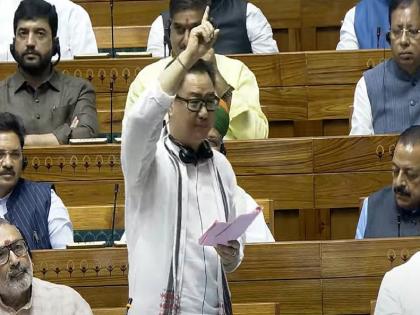Waqf Board: Kiren Rijiju Highlights Disputed Claim Over 1,500-Year-Old Hindu Village During Bill Debate in Parliament
By Lokmat English Desk | Updated: August 8, 2024 19:06 IST2024-08-08T19:05:36+5:302024-08-08T19:06:18+5:30
On Thursday, the government introduced a bill in Parliament to amend the Waqf Board Act. The bill faced opposition ...

Waqf Board: Kiren Rijiju Highlights Disputed Claim Over 1,500-Year-Old Hindu Village During Bill Debate in Parliament
On Thursday, the government introduced a bill in Parliament to amend the Waqf Board Act. The bill faced opposition from several parties, including Akhilesh Yadav, KC Venugopal, and Asaduddin Owaisi, who questioned its provisions. In contrast, Janta Dal (United) and the Telugu Desam Party voiced their support. During the debate, Parliamentary Minister Kiren Rijiju highlighted a controversial incident in Thiruchendurai village, Tiruchirappalli, where a 1,500-year-old village with a predominantly Hindu population was declared a Waqf property by the Waqf Board.
Villagers were stunned to learn that the Waqf Board claimed ownership of their ancestral land, despite lacking strong evidence. The issue, first discussed in 2022, arose in Thiruchendurai, Tamil Nadu. Rajagopal, seeking to sell 1.2 acres of land for his daughter's wedding, was informed at the registry office that an NOC from the Waqf Board was required, as the Waqf Board allegedly owned the village land.
It realized the land couldn’t be sold without a license, sparking chaos in the village. Villagers, who considered their 1,500-year-old Hindu-majority village ineligible for Waqf status, went to the collector’s office to protest. They argued there was no historical Muslim presence in the village. In response, the Waqf Board claimed that local rulers, including Rani Mangammal, had donated the land to them, presenting 220 pages of documentation. An investigation into the matter is now underway.
During the investigation, an inscription in the 1,500-year-old Chandrasekhara Swamy temple revealed that the temple owned hundreds of acres of village land, bolstering the villagers' claim. The Waqf Board, however, failed to provide evidence of when or how the land was transferred to their ownership. This led to calls for amendments to the Waqf Board Act. Additionally, it was discovered that Waqf assets had been incorrectly declared on both government and private lands across the country.
Waqf Board's Role in Protecting Allah's Land
The term "Waqf" refers to property dedicated in the name of Allah. Traditionally, individuals or entities who dedicate their property as Waqf are considered to contribute to Waqf wealth. Under earlier provisions, the Waqf Board had the authority to declare any land as Waqf property, removing ownership rights from individuals or organizations. This includes places such as mosques, graveyards, madrasas, and mazars belonging to the Muslim community, which are managed by the Waqf Board. However, the Waqf Board faces frequent accusations of selling these properties and misusing the funds.